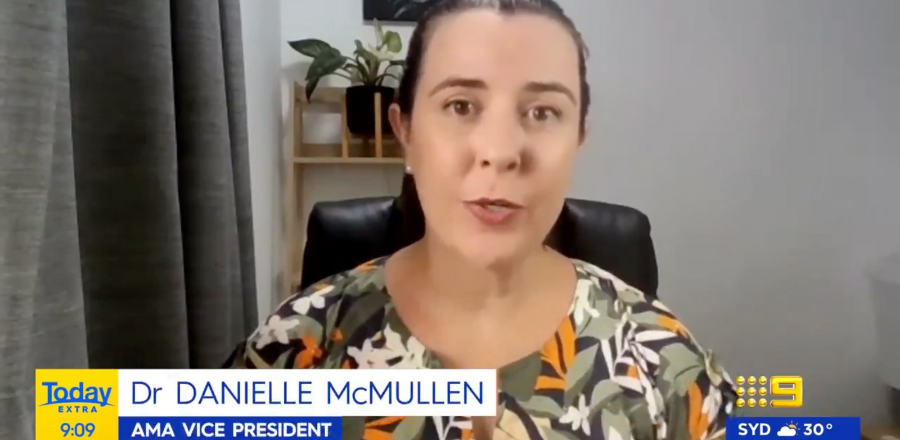AMA transcript of Vice President, Dr Danielle McMullen, on Nine's Today Extra
AMA transcript of Vice President, Dr Danielle McMullen, on Nine's Today Extra, 20 February 2023

SYLVIA JEFFREYS: Well, for the first time today, the Federal Health Department has published a geographic breakdown of bulk billing, and the disparity in how Australians access primary care is shocking. Fewer than 65 per cent have all their GP visits bulk billed and the biggest black spots are in the ACT and Tasmania where more than half of the population cannot see a doctor without paying out-of-pocket fees.
DAVID CAMPBELL: For more, we're joined by the New South Wales AMA Vice President, Dr Danielle McMullen. Danielle, great to have you on the show again. The difference in how Aussies access primary care is a real concern now. Talk us through this data.
DANIELLE MCMULLEN: So what this clearly shows again, and we've seen it the past few months, is how the Medicare rebate - and that's the amount of money that the government chooses to give you back and support you to access healthcare - that really hasn't kept pace for many years. So we're seeing patients face more and more out-of-pocket costs, including now in areas of Australia with lots of people on a low income or in rural and regional areas where we really traditionally try to keep costs down. And so, doctors have been absorbing a lot of this cost for many years. We had a frozen Medicare rebate for six years, and then indexation this year was only about 1.6 per cent when we know that the cost of living was much higher than that. But we're now facing a time where we're having to pass on those costs and we're seeing that across Australia, as the report today showed.
SYLVIA JEFFREYS: Well, the Government has embarked on a long-term reform of the system. What is it going to take, in your opinion, to get this right?
DANIELLE MCMULLEN: The Government has been saying a lot of good things in that space, and we saw the Strengthening Medicare Taskforce report a couple of weeks ago. That has a lot of important reform aspects in it, things like support for longer consultations, strengthening that relationship with your usual GP but better using the team as well, and some better team-based care, as well as better integration of the system so that as a patient you're not stuck telling your story ten times over. So we need to see implementation of all of that. We need the Budget to be a strong health budget, and we need some of that funding to be immediate to make sure that we can ease that cost of accessing healthcare in the short term.
DAVID CAMPBELL: Alright. We'll move on to the major changes coming to New South Wales chemists, where women will be able to renew their scripts for the pill. Is this a good idea to take the burden off the GPs or are GPs worried about it?
DANIELLE MCMULLEN: We were really disappointed to see this decision in New South Wales. The TGA - which is the group that decides which medications are safe to access in a pharmacy and which need a doctor's prescription - the TGA looked at the contraceptive pill just last year and their expert decision was to keep it as a prescription-only medicine to protect the health and safety of women. So we are hugely disappointed that Premier Perrottet has taken the decision to sideline the TGA and take shortcuts on women's health.
SYLVIA JEFFREYS: Well, this is a trial at the moment, so I suppose we'll see how it plays out over the coming months. But in other news, a review which assessed 78 scientific studies, this is an interesting one, found wearing masks in the community probably makes little or no difference to prevent COVID-19. What do you make of this?
DANIELLE MCMULLEN: That was an interesting story this morning and the way Cochrane reviews work, which is what this study was, is they take lots of little studies from all over the world and put them together to come up with an answer. Now, often, that's a really reliable way of doing research, but it doesn't work so well with these community-based studies where every individual study would have had a very different circumstance. So it is one where we need to take some time and really pull it apart. What we do know is that the material that makes up these masks does block COVID-19. Now, what's important is how well does that work in the community when people may or may not be wearing their mask properly. But it's important. COVID-19 is a really significant, severe illness, and it's layers of protection that help us. So vaccinations, staying home when you're unwell, taking antivirals if you're eligible, when you do pick it up, and wearing masks - altogether, those layers of protection do help protect our community.
DAVID CAMPBELL: Just quickly, Danielle, while we've got you, there are calls for food with sugar and fats to have mandatory warning labels, black labels, on the front of the packaging. Do you think this would work?
DANIELLE MCMULLEN: People do struggle in the supermarket to know what is a healthy choice, and in particular, an area of focus we really want to see action on is on sugar sweetened beverages, soft drinks, these drinks with no nutritional benefit where we drink 960 Olympic-sized swimming pools of the stuff every year. We really think that, not just labelling, but also introducing a modest sugar tax would help reduce consumption and make sure that we're keeping Australians safe.
SYLVIA JEFFREYS: Interesting. Alright, always great to get your insights. We appreciate your time this morning. Dr Danielle McMullen, thank you.



